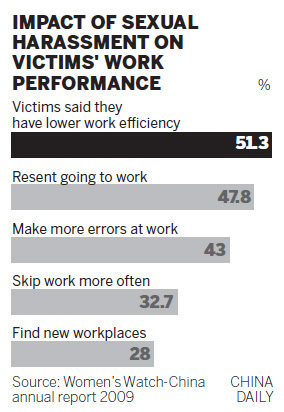Society
Survey finds one in five women sexually harassed
By Wu Yiyao and He Dan (China Daily)
Updated: 2011-05-04 07:22
 |
Large Medium Small |
SHANGHAI / BEIJING - One in five female respondents have experienced sexual harassment at work, according to a recent survey.
The poll found 20 percent of the 1,837 participants from 10 enterprises in Guangdong, Jiangsu and Hebei provinces and Beijing had been sexual harassment victims.
| ||||
The survey was released by Women's Watch China, a Beijing-based non-profit organization.
However, despite the huge number of victims, most choose to stay silent about their ordeals or leave their jobs instead of reporting them or taking legal action against their attackers. They do so because of a lack of support structures and difficulties in gathering evidence, the survey said.
Only 45.6 percent of those who were victimized took issue with their harassers and just 34.3 percent reported the person to managers. Fewer than 20 percent called police or took civil legal action.
 |
In contrast, 87.4 percent of the respondents who had never experienced harassment said they thought they would warn their harassers "if sexual harassment occurred," and 70 percent said they would report or sue the harasser.
The reason why many women who fall victim to such assaults in the real world do not report the incidents is that they worry about negative fallout from doing so, such as being the target of gossip, being forced to leave their jobs and being paid less or downgraded if their harassers are powerful within the company they work for.
Only 5 percent of the victims said they knew who to call after they were harassed and 45 percent said there was not a reporting mechanism where they worked.
"A lot of female victims choose to be silent because they are afraid of losing their jobs, especially when the harasser is their boss or a superior," said Chen Wei, a lawyer specializing in women's issues at Beijing-based Yingke Law Firm.
"Even though some victims are brave enough to seek legal help, they realize it's difficult to collect evidence because the harassment usually happens behind closed doors without someone else present or happens quickly before the victim has time to react," Chen said.
In Guangzhou, 25-year-old Lin Lin (not her real name) decided to leave her job after she was harassed by a senior executive from another branch of her firm.
"I realized that it was sexual harassment because he put his hands on my waist and leaned close to me in a karaoke room during a party," she said.
Lin said later she told her mother and some close friends about the experience, but decided not to report it.
"I think it would be useless to report my case - if reporting worked, there wouldn't be so many similar cases among my female colleagues," she said.
About 81 percent of those surveyed said they would like to see employers bring in better supervision and more appropriate punishments for sexual harassment and 66 percent said employers should offer training programs telling employees how to avoid sexual harassment at work.
| 分享按钮 |


